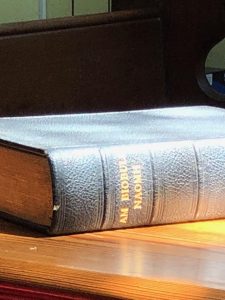As Christians we talk about the Bible, we read it, we preach and teach from it. But oh boy can it be problematical.
 I’ve mentioned how much I value the Bible, and yet also how the Bible’s presentation of God brings up so much that revolts me and seems at odds with the image of God in Jesus. But I see more problems with the Bible, or with how we treat it. Maybe more with how we treat it.
I’ve mentioned how much I value the Bible, and yet also how the Bible’s presentation of God brings up so much that revolts me and seems at odds with the image of God in Jesus. But I see more problems with the Bible, or with how we treat it. Maybe more with how we treat it.
It has been said over and over again that you can argue any opinion from the Bible, and yet even whilst saying this we seem to expect it to deliver one coherent and easily understood message. We expect one version of events, or if there are multiple we say there can’t be any contradictions or differences because the Bible can’t be wrong. Only it is – and I’m not talking about the unicorn references here (that is down to translations, probable extinctions and not a mythological beast)
- The Bible speaks of a stationary Earth with the Sun moving around it.
- The mustard seed is not the smallest seed.
- Pi is not 3 as some dimensions given in the Bible would make it.
- The Canaanites were not all wiped out as the Bible claims in Josh 10:40 and 11:15
- The descriptions of various animals/insects/etc in the food laws are incorrect.
- There are two different orders of creation given – but in both the earth was created before the sun, which it wasn’t.
- The Bible talks of a physical, touchable firmament and does not always seem to do so in the poetic or metaphorical way that it also speaks of the pillars of the earth.
 Then there are the contradictions, in the two genealogies of Jesus, in the two creations stories, in the order of witnesses to the resurrection, in the histories given in Samuel/Kings compared to Chronicles. I could list more mistakes and contradictions, but I think that is enough to make the point. This is before we touch on things that are a matter of belief, creation, Noah, Jonah, Miracles. Or before we look at the scant to missing archaeological evidence for things such as the Hebrew enslavement in Egypt and the Exodus, or the falling of Jericho’s walls. Or before we look at things that are subject to interpretation such as deciding which OT laws apply and which don’t.
Then there are the contradictions, in the two genealogies of Jesus, in the two creations stories, in the order of witnesses to the resurrection, in the histories given in Samuel/Kings compared to Chronicles. I could list more mistakes and contradictions, but I think that is enough to make the point. This is before we touch on things that are a matter of belief, creation, Noah, Jonah, Miracles. Or before we look at the scant to missing archaeological evidence for things such as the Hebrew enslavement in Egypt and the Exodus, or the falling of Jericho’s walls. Or before we look at things that are subject to interpretation such as deciding which OT laws apply and which don’t.
There are explanations for many of these things. Many come down to the way language is used, for instance, in the Joshua passages about the Canaanites the author could have been using a traditional way of speaking about victories in war were they were always total victories, using hyperbole to laud the victor. The stationary Earth with the Sun orbiting it is more likely than not phrased that way by an author with a bronze or iron age understanding of the cosmos. (Joshua is set in the Bronze age, ie, before c1200BC, but probably written in the Iron age, ie after c1200BC).
I have no problem with a bronze or iron age author writing something that reflects their belief and understanding. I have no problem with metaphor and hyperbole. I do have a problem when we say that these words are inerrant.
 Inerrant means without error. Totally without error. When it is applied to the Bible it refers to the teaching that the whole of the Bible is without error, not just on spiritual matters, or those pertaining to salvation. It is also applied to ethical, moral, factual, historical, geological, geographic, sociological and all other matters. This leaves many Christians, myself included for a long time, trying to engage in doublethink; knowing that all these problems exist, but trying to believe faithfully that they are all easily resolved. The more of them we come across and the more we engage with the Bible, the harder it is. It can lead to an unbearable tension as we try to make ourselves believe something that just is not true.
Inerrant means without error. Totally without error. When it is applied to the Bible it refers to the teaching that the whole of the Bible is without error, not just on spiritual matters, or those pertaining to salvation. It is also applied to ethical, moral, factual, historical, geological, geographic, sociological and all other matters. This leaves many Christians, myself included for a long time, trying to engage in doublethink; knowing that all these problems exist, but trying to believe faithfully that they are all easily resolved. The more of them we come across and the more we engage with the Bible, the harder it is. It can lead to an unbearable tension as we try to make ourselves believe something that just is not true.
I’ve stepped out of that. I don’t believe anymore that the Bible is free from error in every respect.
- I believe it is inspired by God.
- I believe it is useful for teaching, rebuking, correcting, training, and equipping.
- I believe it points us to God, as best revealed in Jesus.
- I believe it narrates the story of people’s experience of God in story, poetry, testimony, prophecy, and much more.
However, I find there are things about the Bible I don’t believe anymore.
- I don’t believe that it went word for word from God to the pen of the author.
- I don’t believe it is free from error or contradiction in every way.
- I don’t believe that it is free from human influence.
Accepting error and contradiction is frightening, and because I think it may be inspired to a greater extent than any other material; because I believe that it has proved its usefulness (which was one of the tests for being  accepted into canon); above all, because I believe scripture is where I can meet with God and where I see him revealed in Jesus; then this gives me a massive responsibility to read, pray, listen, study, and question, diligently.
accepted into canon); above all, because I believe scripture is where I can meet with God and where I see him revealed in Jesus; then this gives me a massive responsibility to read, pray, listen, study, and question, diligently.
Accepting error and contradiction is frightening because it means that the solid ground of “The Bible clearly says…” disappears. If I want certainty, then it has to be through knowing Jesus.
Accepting error and contradiction is frightening because what if I am wrong? This isn’t like selecting the wrong jeans size and being able to take them back and exchange. This is serious stuff. If I am wrong, then what will happen when God holds me to account. I can’t take that lightly.
But accepting error and contradiction is also freeing.
It frees me from the tensions of duplicity, from trying to believe what I know is false.
It frees me to stop playing with apologetics and to listen to the Spirit.
It frees me when I can be honest about what I do and do not believe, because it is the truth that sets us free.
It frees me to work out my salvation with fear and trembling.
It frees me to engage with the Bible.
It frees me to be the person God created me to be, someone who thinks, who questions, who reads, prays and studies.
The question is, I suppose, do I want that freedom with the cost of the things that frighten me?
It is for freedom that Christ has set us free.


Great post Carolyn. I agree it can be scary but mostly because we’ve been told to fear this dangerous slippery slope. But perfect love casts out fear. ‘Fear not, for I am with you even unto the end of the age.’